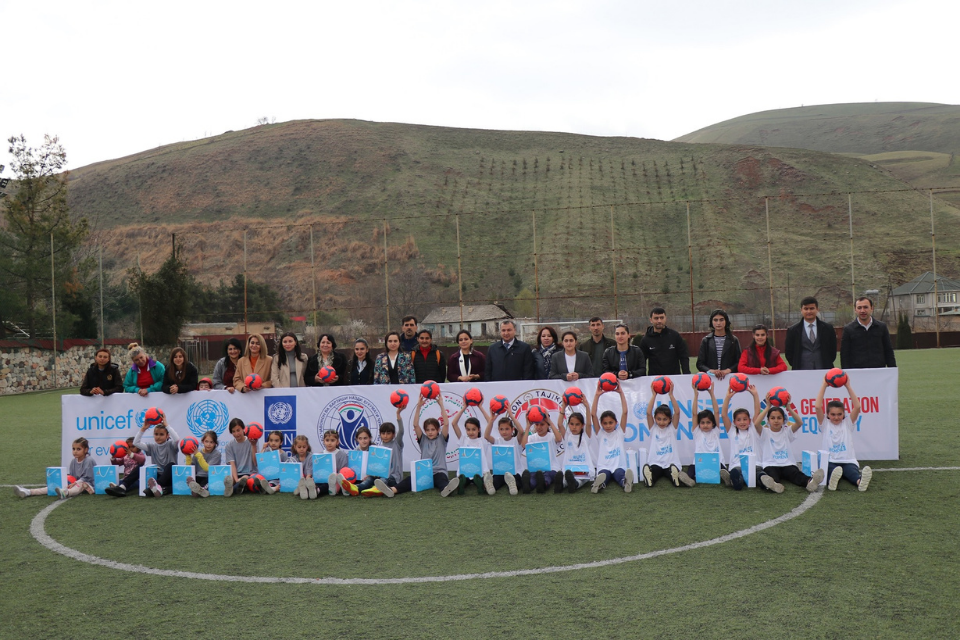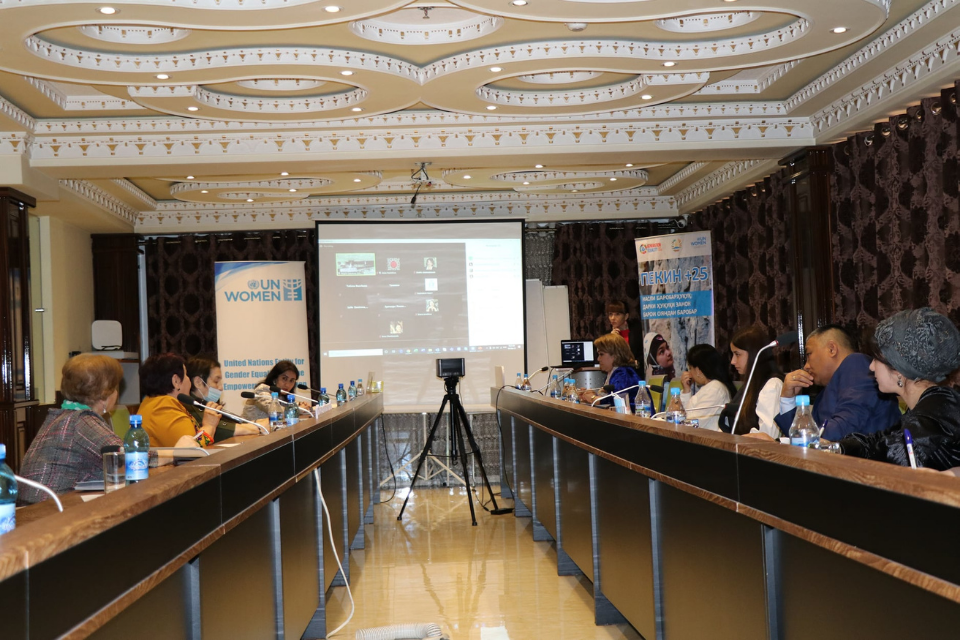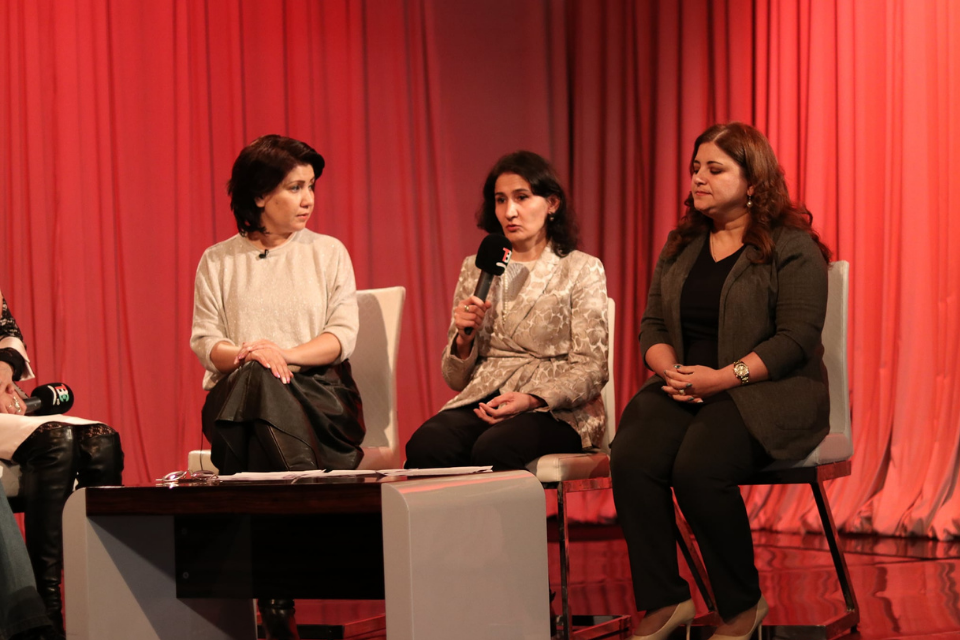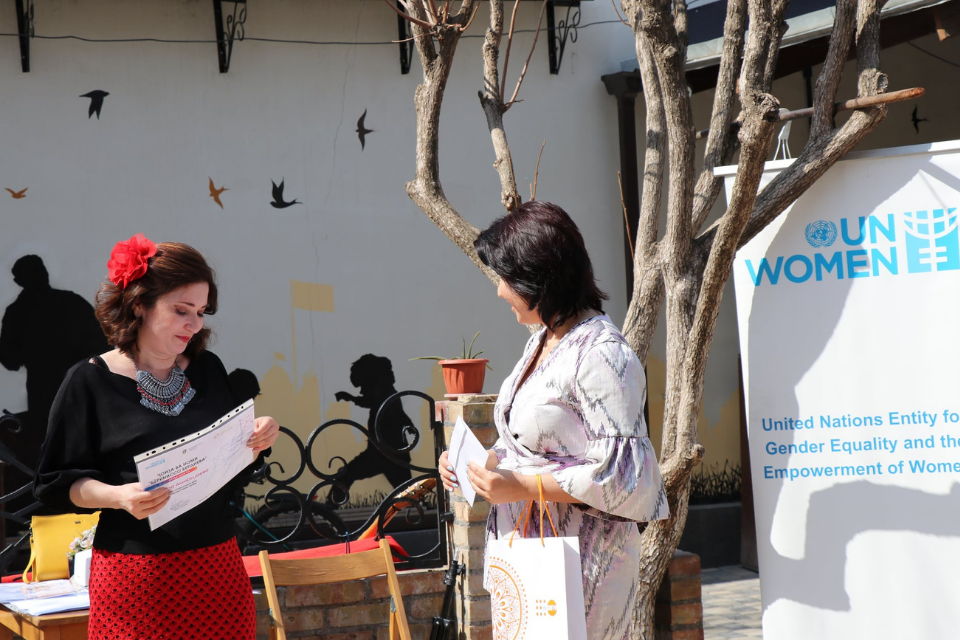Tajikistan commemorates International Women's Day with a range of initiatives
Date:

Promoting women's sports strengthens the role of women and girls in peacebuilding processes.
Sport can help boost the roles of women and girls in peacebuilding. That is why the Committee of Youth and Sports in Tajikistan together with the Women's Football League of the Tajikistan Football Federation and UN Women recently held a round table discussion in Hissor to promote this idea. The event was part of the ‘Empowering youth for a peaceful Tajikistan’ project, bringing together representatives of the Committee of Women and Family Affairs and other UN agencies.
The involvement of girls and women in sports promotes their role in society, changes gender stereotypes, and helps prevent violent extremism by building greater capacities for peace among young people.
During his speech, the representative of the Committee of Youth and Sports, Abdullo Mahmadalizoda, highlighted the active work being done in districts and cities across the country to involve girls in sport and peacebuilding processes. In addition, mechanisms, and programmes to prevent violent extremism among young people have been also developed.
Nushofarin Noziri, a representative from UN Women in Tajikistan, emphasized that involving youth in socio-economic development and sustainability is an important national priority as well as a UN Women objective in Tajikistan.
Team players from the Women's Football League shared some of the challenges that they face in professional sport and in society more generally. They also emphasized the urgent need to breakdown stereotypes in sport.
As a final point of the meeting young girls – football athletes demonstrated their impressive sporting skills, inspiring others to get involved.

Tripartite consultations in the run-up to the 65th Commission on the Status of Women
Ahead of the 65th Commission on the Status of Women, civil society organizations Tomiris and Khamsol-ba-Khamsol initiated a consultative meeting bringing government, civil society, and UN representatives together in Dushanbe on 3 March.
Officials from the Committee on Women and Family Affairs attended the event alongside representatives from over 20 civil society organizations from all of the country’s regions, as well as civic activists, and representatives of the UN system.
Attendees spoke about the importance of women’s and girls’ full and effective participation in decision-making processes, also their participation in the country’s public life, and the need to eliminate violence to empower women and girls and achieve gender equality. Attendees also discussed what effective post-pandemic peace reconstruction looks like, and women's participation and leadership in fighting the pandemic.
Representatives of youth, volunteers of international initiatives, and girls with disabilities also shared their experience on issues of empowerment. They discussed the innovative approaches to promote gender equality and supporting girls with disabilities affected by violence in rural areas.
As a result of the event, participants developed a set of recommendations that will be presented at #CSW65 online at the end of March. The recommendations focused on several areas. These included: unequal access to different services, strengthening and involving all stakeholders in decision-making processes aimed at ending violence against women. The recommendations also focused on ensuring the equal rights for women and girls, as well as developing a clear system for the monitoring and evaluation of national strategies aimed at gender equality and the promotion of women’s participation.

TV show puts the spotlight on women’s leadership
UN Women in Tajikistan, in partnership with the TV channel Safina, launched a special programme, Theme of the Day by Nargis Kasymova, the popular TV host and civil activist.
The topic of the programme was: ‘The role of women leaders in achieving an equal future in a COVID-19 world’. The speakers were representatives of the Committee on Women and Family Affairs under the Government of Tajikistan, leaders of public organizations and representatives of active youth in the country.
During the programme, participants stressed the importance of women's active participation in the political and social life of the country during the pandemic and ensuring equal access to education. The programme guests also noted the contribution of state and international initiatives and also communities in promoting the rights of women and girls.

Best women-journalists of 2020 awarded in Tajikistan
UN Women in Tajikistan, in cooperation with the Coalition of Women Journalists and the United Nations Population Fund office in Tajikistan (UNFPA) organized an award ceremony for the best women journalist in 2020.
Twenty-eight applications were submitted for the award, including representatives of online news sites, radio, and TV companies from different regions of the country. Among the applicants were those with extensive media experience and young journalists who are just beginning their careers.
The best works, created by women journalists in the difficult year of 2020, reflected the most topical public issues, including violence against women and children, problems faced by people with disabilities, and the role of women in the society. Analytical pieces and short essays, video reports and audio podcasts, travelogues and city sketches were received from nominees. Each piece involved a story of someone who is changing the lives of others in big cities and small towns.
The awardees included:
- Gulnora Amirshoeva for the development of Tajik Journalism
- Jamilya Mirbozkhonova for the best material in print/online media
- Darya Khristalyubova and Maftuna Shukurova for the best material on Radio/TV